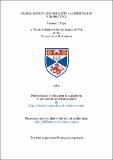Globalisation and equality : a libertarian perspective
Abstract
Why are some people rich and others poor. Why are some states more prosperous than others. In answering these questions, the public and scholars alike often take the rarely challenged position that economic inequalities result from past or present discrimination or other forms of injustice. Evidently, few believe that all economic inequality is produced by injustice; slackers are despised for their unwillingness to help themselves; countries with failing economic policies do not go uncriticised. Nevertheless, the belief that economic disparities arise because of calculated injustice is deeply ingrained. Underlying this conviction is the assumption that "given equal opportunity, all people would perform equally well". In fact, this assertion ignores instances of economic success achieved despite vigorous negative discrimination. There are many examples of poor, migrant minorities, who, despite transplantation into alien, discriminating environments, succeeded in out-performing the indigenous population and so incurred envy, resentment, and worse. What remains inescapably evident is that people differ in their ability to utilise opportunities presented by a free market system. Defensively, under-performing groups therefore invest energy in securing state interference to change market outcomes in their favour, and demonise the free market system as inherently unjust. In fact, it can be shown that the only economic arrangement compatible with the equality of all individuals and groups before the law is the free market. Globalisation facilitates the spread of this free market system. It should, therefore, be welcomed as the path to greater economic prosperity and greater equality before the law for everyone.
Type
Thesis, PhD Doctor of Philosophy
Collections
Items in the St Andrews Research Repository are protected by copyright, with all rights reserved, unless otherwise indicated.

